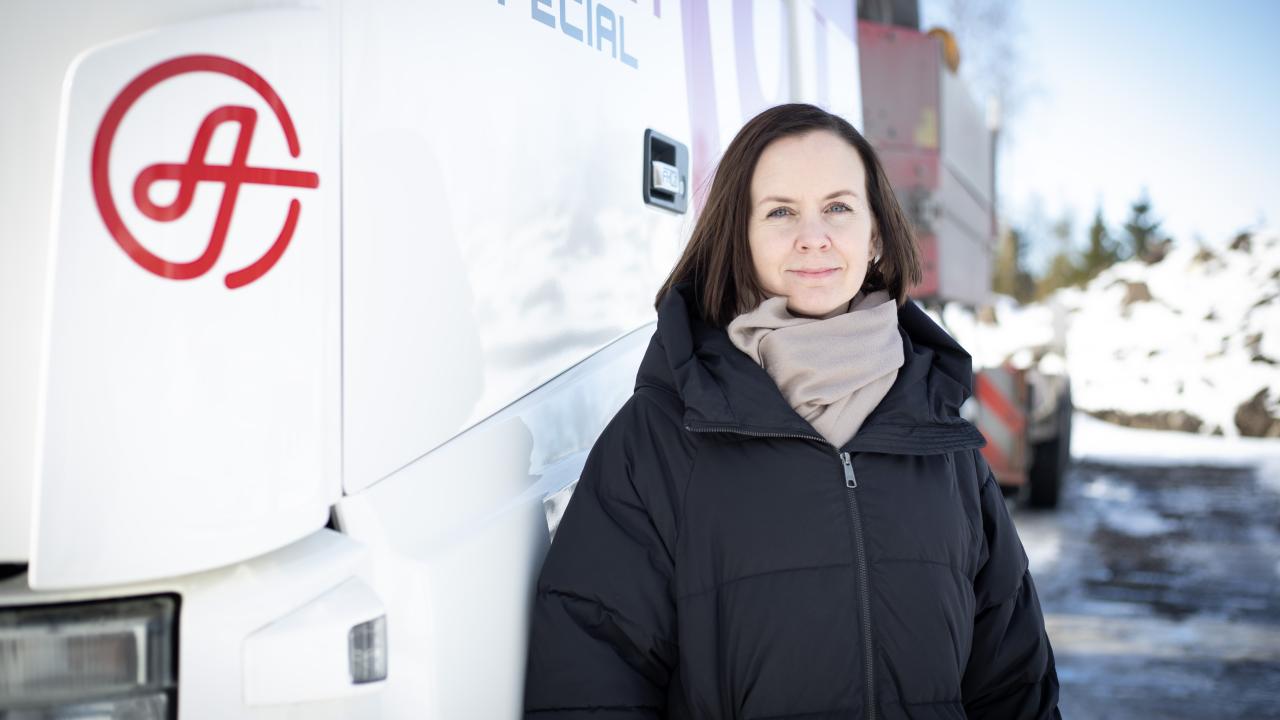Ida Saavalainen chose the Hanken Executive MBA to gain new tools to run the family business

After her studies, Hanken alumna Saavalainen worked for a few years at ABB in Helsinki before moving to Kokkola to work at the transport and logistics company Ahola Group in late 2009. Saavalainen has been head of the third-generation family business since September 2022.
The company, founded by her paternal grandfather Helge Ahola in 1955, predominantly transports goods for retail and industry. The main markets are the Nordic countries, the Baltic countries and the CEE countries (EU member states that were formerly Eastern bloc nations). Sweden has been their largest market virtually from the beginning.
In addition to her job, Saavalainen is attending the two-year Hanken Executive MBA programme.
“The best thing about the Hanken EMBA is that I have gained a broad view of leadership and strategic planning, including many topical, real-world aspects. I have definitely gained new insights and can look at things from a new perspective.”
Testing out theory in practice
Saavalainen graduated from Hanken in 2007 with a business management and organisation major.
“Studying now is completely different, in a position where you can immediately put the things you are reading about to practice. It's easier for me to challenge the management team as I have acquired more tools and new approaches.”
New ways of thinking come in handy as the logistics industry faces significant changes like most other industries. They include issues around the transition to a green economy, which brings a lot of adjustments, but also opportunities. The central point within the industry is the debate around fossil fuels, where alternative fuels are gradually being used, including e-, gas and hydrogen-powered trucks. The challenges of driver shortages are also a growing concern in the industry.
“Despite the challenges, we are positive about the future, and the opportunities in the logistics industry are plentiful: goods will need to be moved from one place to another in the future as well. We want to be at the forefront and ensure the industry stays appealing.”
The Ahola Group is used to being a forerunner. As early as in the 80s, the company developed its own concept that set it apart from other transport companies. The company does not have its own terminals, but it drives customers' goods from the sender directly to the recipient, acting as its customers' warehouse on wheels. The company has between 500 and 550 vehicles operating on the roads, a staff of 250, and employs around 700 people via contracted transport providers.
Combining an EMBA education with running a family business and having three young children has been both easy and challenging, says Saavalainen. The fact that the programme has a limited duration of two years makes it easier to manage.
“It is impossible to predict what will happen at work, but I have tried to devote a few hours per week to the programme during my working hours. After all, most of what we do in the programme is work-related.”
The value of networking and brainstorming
Since Saavalainen attended Hanken herself, Hanken& SSE felt like a natural option, yet it was not a clear-cut choice.
"I looked around at different alternatives, including abroad. But ultimately, the selection of courses, combined with the practical group size and price level, made me choose the Hanken EMBA."
One of the best things about the EMBA programme is the other participants, says Saavalainen. Since the group sizes are sufficiently small, a productive dynamic can form, and there is enough time for discussion.
"Getting to know everyone, networking, and brainstorming is incredibly valuable. We have different backgrounds and work roles. Hearing new points of view is enriching."
If there were something Saavalainen would enhance about the programme, it would be to highlight entrepreneurship within small and medium-sized enterprises, and major global companies.
What kind of person would she recommend the programme to?
“I recommend the EMBA to many people – both to people in leadership positions who graduated some time ago and to those who might not even have a degree in the field. Anyone who wants to upskill but also has at least a few years’ work experience, to get the maximum benefit from the programme.”
Read more:
Text: Jessica Gustafsson
Photo: Ahola Group

